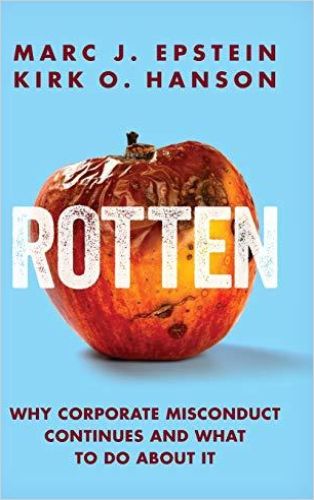Former business professors Marc J. Epstein and Kirk O. Hanson offer suggestions for curtailing corporate malfeasance and illustrative tales of corruption.

Make Business Moral
Alas, the scale and persistence of corporate malfeasance probably doesn’t surprise you. Laws, regulations, fines, jail sentences for offenders and ethics courses in business schools to the contrary, illegal actors, bad players, toxic organizations and unprofessional corporate cultures inflict quite a toll. Marc J. Epstein and Kirk O. Hanson – experts and pioneers in the study of corporate misconduct and ethics – argue that corporate corruption will worsen unless schools, churches, parents, governments, and especially corporate leaders, boards and CEOs take ethics more seriously.
Most corporations believe the company exists for the shareholders alone; only a very few embrace genuine concern for a broader set of stakeholders. Marc J. Epstein and Kirk O. Hanson
Epstein, a prolific author, taught at Harvard, Stanford, INSEAD and Rice University business schools. Hanson taught at the Santa Clara and Stanford schools of business. They don’t waste time wringing their hands and gnashing their teeth over how terrible corporate bad actors can be; instead, they recite this litany of corruption to inspire you to spur those who can do something about it to do something. And if you are among those who can take curative action, all the better.
Corporate Wrongdoing
Despite decades of efforts to curtail corporate wrongdoing – including fines, regulations, prison sentences and ethics programs – the problem has not gone away or improved.
Rotten corporate conduct holds back our economic development and sows doubt that business and the free-market system contribute to a better society.Marc J. Epstein and Kirk O. Hanson
Since 2000, firms have paid billions in penalties and investors have lost billions to criminal malfeasance. Laws intended to hold leaders accountable and larger fines intended to curtail criminal conduct have not proven to be effective deterrents.
Bad Apples, Barrels and Orchards
Epstein and Hanson state that corporate malfeasance springs from the actions of individuals (bad apples), entire firms (bad barrels) and corrupt environments (bad orchards).
Bad apples are employees who overstate their expense accounts and bully their co-workers. Stricter hiring processes and rules won’t prevent bad behavior, and companies can’t blame every scandal on bad apples alone. Bad managers, bad structures, poorly-designed incentives or misguided leaders often set the stage for wrongdoing.
Organizations become bad barrels through misguided reward systems, weak controls, poor attitudes about industry regulations, toxic cultures, or leaders whose actions, decisions and attitudes inspire wrongdoing. Even honest firms dislike the costs and complexities of compliance. Governments often lack the resources to monitor corporate actions and enforce regulations.
Some industries, regions or nations are rife with corruption. These bad orchards spawn bad barrels and bad apples.
Find Bad Apples
Corporate greed, fraud and various wrongdoings brought about the Great Recession of 2008-2009, wiping out millions of dollars of savings and equity.
However, leaders can overcome negative pressures and instill ethics and a values-based culture.
To root out bad apples, test job candidates for narcissistic traits, character flaws, lack of empathy, low intelligence, weak skills, financial trouble and, especially, past incidents of wrongdoing. Corporate incentives, training and communications should emphasize ethics. Governance should provide boundaries, and firms should monitor leaders’ and teams’ actions and decisions.
Corporate executives need to be creative enough to find ways of getting things done in difficult competitive environments without violating ethical norms. Marc J. Epstein and Kirk O. Hanson
Some organizations get rid of bad orchards – corrupt companies or divisions. Some work within their industry to set standards or work with governments to enforce rules. And, of course, some embrace corruption. Other firms sidestep potentially corrupting market pressures by organizing as B Corps, which pursue social gains, public welfare and profits while catering to varied stakeholders – not investors only.
Purpose Beyond Profit
Boards should oversee initiatives t0 instill adequate governance and accountability. Firms should make public their values and ethics and hold all leaders – including managers and supervisors – accountable for upholding the firm’s values and for ensuring their teams do the same.
No corporate initiative or standard is taken seriously unless there is a senior executive paying constant attention to it and adequate staffing to implement the programs that comprise it.Marc J. Epstein and Kirk O. Hanson
Companies should provide training in ethics and governance, develop a system for employees who wish to make reports and adopt a whistleblower protection policy. Executives should visibly and vocally champion this effort.
Strategies
To overcome misconduct, the authors recommend linking process with purpose; explain how your firm benefits its employees, customers and community. Underscore the organization’s commitment to ethics and values. Link strategy to purpose, as well. Assess each decision through the lenses of your values, ethics, mission and purpose. Convey your moral message from the board and C-suite level throughout the workforce, and align executive actions with the firm’s commitment to ethics and integrity. Recognize and reward leaders who hold themselves and their teams accountable. Make middle managers and supervisors accountable, too.
Integrate ethics and morals into your strategy and decision-making; enable compliance officers to review all decisions, proposed initiatives and strategies through the prisms of values, ethics and purpose. Executives should lead discussions with employees about these matters, and leaders must protect employees who report ethics violations, so they do not face either overt or subtle retaliation.
Organizations get what they reward, so evaluate your incentives, communication, marketing, supply chain, governance, business practices, and products and services against your ethics, values and purpose.
Ask your board to review decisions, strategies, risks and opportunities through the lens of morality and ethics. Take swift action against misconduct.
Attempting a Moral Text
The authors combine litanies of corporate malfeasance with possible solutions, though they seldom address simple human nature and, you know, greed. Do they believe solutions can be legislated, as they suggest? Or is that part of attempting to craft a moral text that raises moral issues and then proposes moral solutions?
Their cause and effect reductivism strongly suggests that the authors intend this more as a college text than as a general interest overview of corporate corruption. Their proposed solutions all seem workable and, yet, still overly earnest. However, they write well, feelingly and optimistically about the need for immediate change and a wide embrace of proper behavior. You can only wish them good luck with that.
Marc J. Epstein and Kirk O. Hanson also co-authored The Accountable Corporation. Epstein co-authored Social Impacts with Kristi Yuthas and Pharmacy on a Bicycle with Eric Bing, among other titles.






